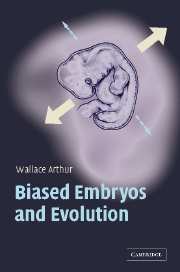Book contents
- Frontmatter
- Contents
- Preface
- Acknowledgements
- 1 The microscopic horse
- 2 What steers evolution?
- 3 Darwin: pluralism with a single core
- 4 How to build a body
- 5 A brief history of the last billion years
- 6 Preamble to the quiet revolution
- 7 The return of the organism
- 8 Possible creatures
- 9 The beginnings of bias
- 10 A deceptively simple question
- 11 Development's twin arrows
- 12 Action and reaction
- 13 Evolvability: organisms in bits
- 14 Back to the trees
- 15 Stripes and spots
- 16 Towards ‘the inclusive synthesis’
- 17 Social creatures
- Glossary
- References
- Index
5 - A brief history of the last billion years
Published online by Cambridge University Press: 02 December 2009
- Frontmatter
- Contents
- Preface
- Acknowledgements
- 1 The microscopic horse
- 2 What steers evolution?
- 3 Darwin: pluralism with a single core
- 4 How to build a body
- 5 A brief history of the last billion years
- 6 Preamble to the quiet revolution
- 7 The return of the organism
- 8 Possible creatures
- 9 The beginnings of bias
- 10 A deceptively simple question
- 11 Development's twin arrows
- 12 Action and reaction
- 13 Evolvability: organisms in bits
- 14 Back to the trees
- 15 Stripes and spots
- 16 Towards ‘the inclusive synthesis’
- 17 Social creatures
- Glossary
- References
- Index
Summary
Bizarrely, it appears that space, time, energy and matter all erupted from a dimensionless point in nothingness about 15 billion years ago. So my ‘brief history’ covers the last one-fifteenth of the whole of time. It will, however, be a very biased – or do I mean selective? – history of that particular period. Bias and selection will, as you'll soon see, turn out to be two of the most important words in the book, and it won't hurt to examine their meanings a bit here. But this will be easier to do if I first tell you about the various ways in which my history is going to be biased or selective; let's just call it incomplete for the moment.
First of all, I will deal only with our own planet (age c.4.5 billion years), despite the fact that there are probably lots of other biospheres elsewhere with their own fascinating evolutionary processes being acted out right now, as you read this. Since we know nothing about these, apart from the fact that there don't seem to be any in our own solar system, I can hardly be blamed for this massive omission.
Second, I will deal almost exclusively with the history of life forms in my chosen period, and will say little about the physical world. This is an obvious choice, given my overall focus, though we should never forget that all creatures inhabit particular places, so the physical world matters to them, in both the short and the long term.
- Type
- Chapter
- Information
- Biased Embryos and Evolution , pp. 53 - 65Publisher: Cambridge University PressPrint publication year: 2004



